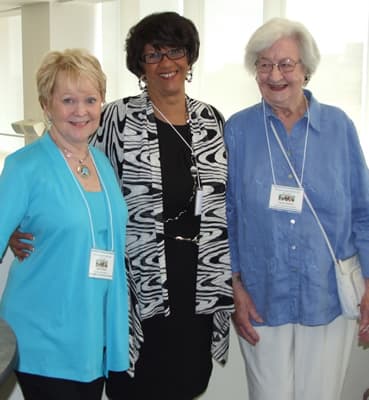
A rowdy mob walked shoulder to shoulder with Dorothy Counts-Scoggins as she neared the doors of Harding High. Some yelled slurs, threw rocks or spat. It was the first day of class in 1957, and integration had started in Mecklenburg County. Counts-Scoggins was one of the first four black students to enroll at formerly all-white schools in Charlotte. In the years since, the area has been at times been a model for both what can go right, and at others for what can go wrong, when balancing a school district.
More than five decades later, what remains consistent is conversation on the issue. It was standing room only in the auditorium at UNC Charlotte Center City last week as more than 200 people — including 73-year-old Counts-Scoggins — gathered to discuss the city’s long-waged battle to find equity in the racial and economic makeup of its schools.
Featuring veteran journalist Frye Gaillard and UNC Charlotte Urban Institute Social Research Director Amy Hawn Nelson, “A Dream Again Deferred” traced Charlotte’s history from the landmark Brown vs. Board Education decision through the desegregation controversy of the 1970s to Charlotte-Mecklenburg School’s (CMS) increasingly resegregated schools of today.
The statistics Hawn Nelson shared unsettled the audience, often drawing a chorus of gasps. Today, half of Charlotte-Mecklenburg Schools are more than 80 percent students of color, and one in three schools have more than 80 percent of students living below the poverty line. One in six schools has twice as many white students as the district at large.
Hawn Nelson said asking what part of segregation hurts students most is “akin to asking what aspect of junk food is most damaging to a body.”
Studies show students in racially isolated schools get lower paying jobs and are more likely to go to jail, effects magnified in minority or poor populations. Isolated students also are less likely to develop tolerant and inclusive viewpoints toward other racial groups, according to Hawn Nelson. Though Charlotte remains one of the highest-performing urban districts in the country, such is the fractured environment many students face today.
But it wasn’t always this way.
At one time, CMS was considered a prime example of a successfully integrated school district. In 1970, the Supreme Court’s decision in the Swann case sent shockwaves across the area. The court unanimously agreed that CMS needed to balance the racial makeup of schools; the busing program the district set up to do so was initially controversial but ultimately successful.
What followed was what Gaillard, a former editor at the Charlotte Observer, called “a golden age” for Charlotte-Mecklenburg Schools. While many families embraced the integrated learning environments, not everyone was happy.
A parent whose child was kept out of their preferred school because of racial quotas filed a lawsuit and turned the tide on integration. The judge in that suit ruled it was illegal for districts to use race to determine school assignment. The decision ended the busing program and sent CMS on the path to where it is now.
Gaillard and WBTV reporter Steve Crump led the audience through that tumultuous history in a free-flowing conversation between two men who have been deeply involved in covering segregation in CMS.
Hawn Nelson’s ensuing presentation provided a snapshot of where the district is now and considered the way forward. The native Charlottean admitted that the community is unclear on exactly how to remedy school imbalance. Hawn Nelson said increasing funding to segregated schools does not work. Instead, the solution might be redrawing the assignment map with equity in mind, she contended.
Whatever the strategy, Hawn Nelson said the people of Charlotte have to be in driver’s seat. “I think that the ‘should’ questions must be a directive from the community, and the ‘how’ should be determined by the school board with community input.”
As those questions lingered in the packed auditorium, Counts-Scoggins could take solace in the fact that today it’s far easier to meet a crowd interested in bringing people together than it is to find one intent on driving them apart.
The UNC Charlotte College of Education, DVA Charlotte and the Z. Smith Reynolds Foundation co-sponsored this event.
Photo inset: Dorothy Counts-Scoggins (center) attended the UNC Charlotte program.